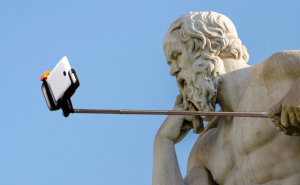Millennials, take heed. If your parents said you could be whatever you wanted to be when you grew up, they may have set you up for an unhappy future, says the author of a new book on self-obsession in Western culture.
British journalist Will Storr’s “Selfie: How We Became So Self-Obsessed and What It’s Doing to Us,” explores how Westerners became a bunch of selfie-shooting strivers trapped in a cycle of trying to perfect themselves — or, at least, project a perfect image of themselves.
His findings: Our self-obsession has dangerous consequences, and in his view, leads to depression and suicide. His interview subjects include a woman who spends hours a day curating her vast selfie collection for public consumption, but admits that privately, she’s a self-cutter.
“I think the selfie exposes who we’ve become,” Storr told MarketWatch.
Originally the selfie camera was intended to help us communicate with others through programs like Skype or FaceTime, Storr said, but most of us use it to snap self-portraits and upload them for likes or follows.
“I think the fact we reacted like this really shows that we have become more self-focused,” Storr said.
How did we get so overwhelmed by self-obsession? Blame the rocky shores of Ancient Greece, which was bad for farming but good for the birth of our runaway individualism, Storr explains.
Ancient Greece was the birth of Western individualism, Storr said. “You couldn’t really do agriculture in Ancient Greece. It was made up of a thousand city states all on these rocky shores and islands. So to get along and get ahead in Ancient Greece you had to be this self-starter. You had to be making olive oil and trading it or fishing and selling your fish.”
“It was a very individualistic society,” Storr added. “We began to see the world as made up of individual pieces and parts, and then from that comes this idea of the individual human being as this node of potential and possible perfection, so all the pressure gets placed on the individual.”
Fast forward 2,500 years, and Storr sees a link between epidemic self-obsession and the “despair deaths” that have been claiming the lives of white, working-class middle-aged men. Storr says that alarming trend is a consequence of what he calls “the age of perfectionism.”
“There’s this increasing pressure on us to be perfect in all kinds of different domains, whether we have the perfect body or the perfect job or be the perfect father or perfect mother,” Storr said.
“Middle age is when a lot of us hit our limitations. We spend our youth dreaming and being ambitious and trying to be this amazing person. We hit middle age and we realize we’re not going to end up being Larry Page or whoever.”
Of course, our individualistic tendencies have positive outcomes too, Storr noted. “It makes us believe that we can get there if we really try,” Storr said. “And that’s great for lots of reasons — I mean, look at what we’ve achieved in the West. We’ve invented amazing things, we’ve done amazing things.”
Is there hope for our hopelessly self-centered souls? Storr says we can break free of self-obsession if we are honest with ourselves about human beings’ limitations.
“We’re brought up in this post-human potential environment where we all believe we’re like gods and we’re all powerful and we can just choose to be Beyoncé or we can choose to be Michael Jordan,” Storr said. “And it’s not true. We’re limited. When we fail it’s often not our faults.”
He added, “It’s good that we’re encouraged to shoot for the stars, but when we don’t reach them, it’s also good that we don’t beat ourselves up too badly.”
Source: nypost
Ask me anything
Explore related questions





